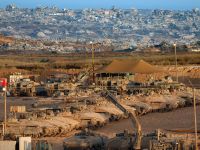Pakistan's military government has slammed as "mischievous" a report by the Human Rights Watch which said respect for civil and political rights slumped in the country following last year's coup.
An official spokesman said General Pervez Musharraf's government had "tried to address the gamut of problems faced by the people and met with reasonable level of success."
The report of the Washington-based organization was "mischievous, biased and misleading," the spokesman said, in a statement late Saturday revealed by the state-run Associated Press of Pakistan.
He said the military government "firmly believes in rule of law and only corrupt politicians and bureaucrats who played havoc with national wealth are being targeted and brought to justice."
"Judiciary is free and the press today is enjoying unprecedented freedom, comparable to the freedom of thought and press in advanced nations."
The government will hold municipal polls, starting from the end of the current month, and the process of "restoration of democracy will be completed within the timeframe granted by the Supreme Court of Pakistan."
The court in May validated the military coup and gave the rulers until October 12, 2002 to complete their reform agenda and hold general elections to the return the country to democratic rule.
The spokesman said law and order in Pakistan was much better than ever before and women "enjoy better rights than in the most parts of the world as also enunciated in the tenets of Islam."
The Human Rights Watch report released Thursday said respect for civil and political rights "significantly deteriorated" in Pakistan following the coup.
"Opposition party members were subjected to prolonged detention without charge; some were tortured in custody," it said, ahead of International Human Rights day.
The Musharraf regime "moved to neutralize political parties" through the application of laws governing terrorism, sedition, and public order, and through the extra-constitutional "accountability" bureau, it said.
The group acknowledged the adoption of Pakistan's first federal juvenile justice law and the establishment of a commission on the status of women, but said these steps forward were marred by major steps back.
The regime had "greatly augmented executive powers and curtailed the independence of the judiciary," the report said.
Musharraf seized power after ousting prime minister Nawaz Sharif in a bloodless military coup in October 1999.
In a dramatic development, Sharif was released from jail and sent into exile in Saudi Arabia on Sunday after receiving a presidential pardon – ISLAMABAD (AFP)
© 2000 Al Bawaba (www.albawaba.com)







